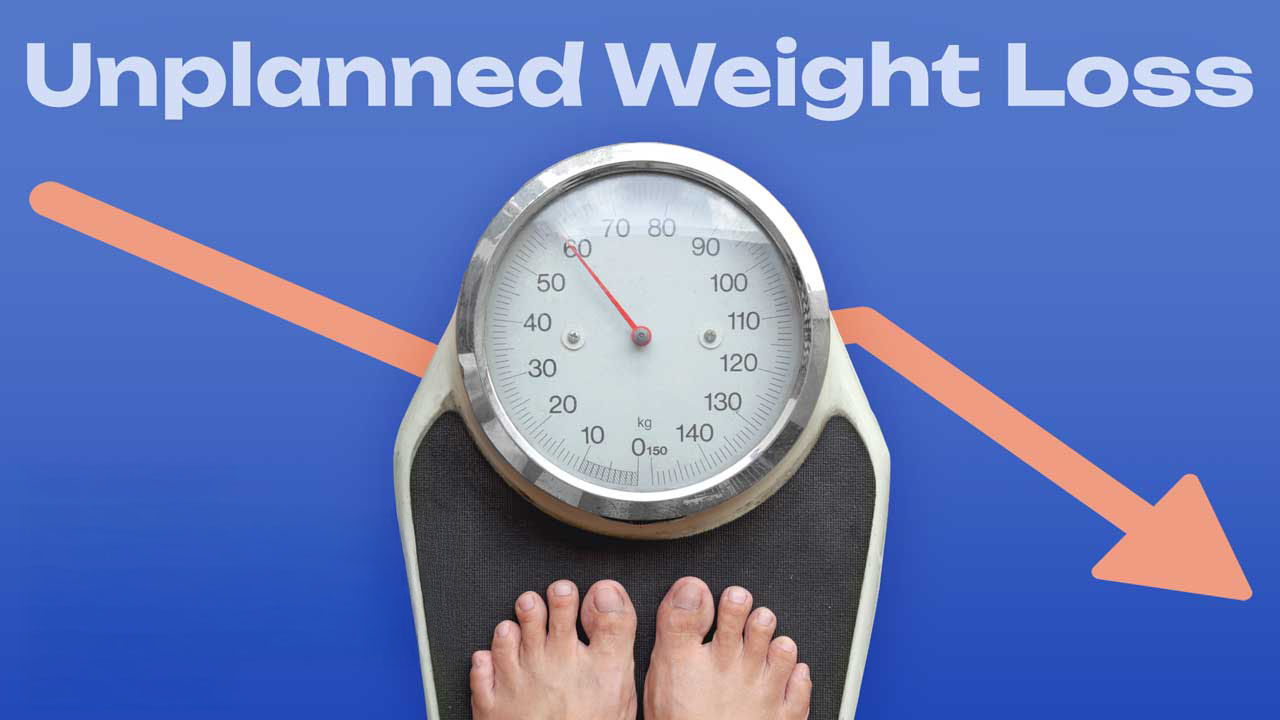What is Unplanned Weight Loss?
Unplanned weight loss occurs in aged care settings when an older person experiences an unintentional reduction in body mass. In these cases, there is no written strategy or ongoing record detailing planned weight loss (DoHaAC 2023).
According to the National Aged Care Mandatory Quality Indicator Program, there are two categories of unplanned weight loss:
- Significant unplanned weight loss, where a person loses greater than or equal to 5% of their body weight within three months.
- Consecutive unplanned weight loss, where a person loses any amount of weight every month for three months in a row.
(DoHaAC 2023)
For example:
Consider a person who initially weighed 80 kg.
- After one month, they weigh 79 kg.
- After two months, they weigh 77.5 kg.
- After three months, they weigh 76 kg.
The person lost 5% of their body weight (4 kg) within three months and lost some amount of weight for three consecutive months. Therefore, they have experienced both significant and consecutive unplanned weight loss.
Note: Interventions may be required if an older person has a BMI of <20 (if under 70 years of age) or <22 (if over 70 years of age) (Vic DoH 2023).
Causes of Unplanned Weight Loss in Older People
It’s estimated that up to 68% of aged care clients are malnourished or at risk of malnutrition (RCACQS 2021).
Weight loss often occurs when daily nutritional requirements are not being met. This could be due to food quality, difficulties with eating or the food failing to meet a person’s cultural or religious needs (RCACQS 2021).
Sometimes, weight loss is caused by an underlying health condition, even among clients who eat healthy and nutritious diets (My Aged Care 2022).
Unplanned weight loss may also be associated with age-related changes to the body, such as:
- Loss of taste, smell or sight
- Changes to the digestive system
- Swallowing difficulties
- Oral hygiene issues (e.g. missing or decayed teeth, poorly fitting dentures)
- Feeling full more quickly
- Decreased appetite
- Decreased capacity to store water
- Changes to functional capacity (e.g. mobility, dexterity).
(DoHaAC 2023)
Other specific factors that may be associated with weight loss include:
- Acute illness
- Dementia or other cognitive impairment
- Polypharmacy or medication side-effects
- Anxiety and/or depression
- Bereavement
- Chronic illness
- Social isolation
- Pain
- Poor food quality
- Issues related to the dining experience
- Staffing challenges (e.g. inadequate staff to assist with meals).
(DoHaAC 2023; My Aged Care 2022)
Consequences of Unplanned Weight Loss

Unplanned weight loss is associated with several adverse health effects among older adults, including:
- Increased susceptibility to illness
- Decreased immune function
- Frailty
- Loss of independence
- Decreased emotional and social health
- Impaired thermoregulation
- Inactivity
- Increased risk of fractures
- Impaired wound healing
- Impaired strength and mobility
- Impaired elimination (e.g. dehydration, constipation)
- An overall decrease in quality of life
- Death.
(DoHaAC 2023)
Unplanned Weight Loss as a Quality Indicator
Being able to detect and manage unplanned weight loss in older people is essential.
Unplanned weight loss is common among older people and poses serious risks. For this reason, it is a key quality indicator under the National Aged Care Mandatory Quality Indicator Program (QI Program).
The QI program outlines specific indicators that all government-subsidised aged care facilities must report on to measure the quality and safety of their services and facilitate continuous improvement (My Aged Care 2022).
Under this program, all older people receiving residential aged care should be weighed monthly (DoHaAC 2023).
Raw data about each consenting older person’s weight must be submitted to the Government Provider Management System (GPMS) every quarter (replacing the My Aged Care Provider Portal) (DoHaAC 2023).
Note: The following care recipients do not need to have their weight data submitted to the QI Program:
- Older people who withhold consent to being weighed
- Older people receiving end-of-life care
- Older people who do not have the required weights recorded (e.g. starting and/or finishing weight).
(DoHaAC 2023)
The provider must report the number of care recipients excluded due to being in one of the above categories (DoHaAC 2023).
Weighing Clients
To ensure that weight data is as accurate as possible:
- Weigh each person at a similar time of day every month
- Ensure people wear clothing of a similar weight every month
- Use the same scale every month
- Ensure the scale is calibrated.
(Vic DoH 2023)
Unplanned Weight Loss Under the Strengthened Aged Care Quality Standards
The strengthened Aged Care Quality Standards require unplanned weight loss to be assessed and managed.
- Standard 5: Clinical Care - Outcome 5.5: Clinical Safety (Action 5.5.5) requires systems to be in place to address unplanned weight loss and malnourishment.
- Standard 6: Food and Nutrition - Outcome 6.1: Partnering with older people on food and nutrition (Action 6.1.2) requires systems to be in place to continuously improve food service in response to older people’s food and drink intake. This includes reviewing any unplanned weight loss identified in an older person.
(ACQSC 2024a, b)
The Quality Standards also reiterate the requirement to report unplanned weight loss as part of the QI Program (ACQSC 2024a).
Standardised Care Process for Unplanned Weight Loss
Note: This is the standardised care process for Victoria. Other jurisdictions may differ.
- Conduct a nutritional assessment of all older people upon admission. This should comprise:
- Dietary history
- Medical history
- Physical examination
- Social factors
- Functional ability.
- Recognise any signs of weight loss. Intervene if:
- There is any unplanned weight loss detected
- The person’s BMI is <20 (if under 70 years of age) or <22 (if over 70 years of age)
- The person’s oral intake has been under 50% of their requirement for more than three days
- Sudden weight loss is detected - this requires urgent escalation of care.
- Determine appropriate interventions.
- Refer the person to relevant specialists (e.g., general practitioner, dietitian, speech pathologist, occupational therapist, pharmacist, dentist).
- Ensure the person is being weighed monthly as per the QI Program. Reweigh the client more frequently if weight loss is detected.
- Routinely assess whether interventions are working effectively.
- Discuss the older person’s food and mealtime preferences. Provide them with information about nutrition and maintaining nutritional status.
- Ensure staff are appropriately trained in regards to:
- Nutrition in older people
- Malnourishment risk factors
- How to create a positive dining environment
- How to assist people with eating and drinking
- Religious and cultural food preferences and choices.
(Vic DoH 2023)
Preventing Unplanned Weight Loss in Older People

By regularly monitoring older people’s weight, staff should be able to promptly identify and address weight changes.
Interventions for preventing weight loss may include:
| Food-related interventions |
|
| Dietary interventions (as guided by a dietitian or other appropriately qualified health professional) |
|
| Environmental interventions |
|
| Staff interventions |
|
(DoHaAC 2023; My Aged Care 2022; Vic DoH 2023)
Test Your Knowledge
Question 1 of 3
Frank is a client at your facility who weighed 71 kg upon admission. One month after admission, he weighed 70 kg. After two months, he weighed 70.5 kg. After three months, he weighed 69 kg. For these last three months, Frank would be recorded as having:
Topics
References
- Aged Care Quality and Safety Commission 2024a, Standard 5: Clinical Care, Australian Government, viewed 22 March 2024, https://www.health.gov.au/resources/publications/strengthened-aged-care-quality-standards-august-2025?language=en
- Aged Care Quality and Safety Commission 2024b, Standard 6: Food and Nutrition, Australian Government, viewed 22 March 2024, https://www.health.gov.au/resources/publications/strengthened-aged-care-quality-standards-august-2025?language=en/food-and-nutrition
- Department of Health and Aged Care 2023, National Aged Care Mandatory Quality Indicator Program Manual 3.0, Australian Government, viewed 19 March 2024, https://www.health.gov.au/resources/collections/national-aged-care-mandatory-quality-indicator-program-manual
- My Aged Care 2022, Quality Measures in Aged Care, Australia Government, viewed 20 March 2024, https://www.myagedcare.gov.au/quality/quality-measures-aged-care#unplanned-weight-loss
- Royal Commission into Aged Care Quality and Safety 2021, Final Report: Care, Dignity and Respect: Volume 1 Summary and Recommendations, Australian Government, viewed 20 March 2024, https://agedcare.royalcommission.gov.au/sites/default/files/2021-03/final-report-volume-1.pdf
- Victoria Department of Health 2023, Unplanned Weight Loss: Standardised Care Process, Victoria State Government, viewed 20 March 2024, https://www.latrobe.edu.au/__data/assets/pdf_file/0005/1152815/standardised-care-unplanned-weight-loss.pdf
 New
New 
